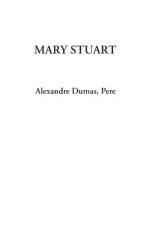It was the second time, after long hatred on Lady Douglas’s part and contemptuous indifference on the queen’s, that the two women were face to face; therefore the queen, with that instinctive impulse of coquetry which urges women, in whatever situation they find themselves, to desire to be beautiful, above all for women, made a sign to Mary Seyton, and, going to a little mirror fastened to the wall in a heavy Gothic frame, she arranged her curls, and readjusted the lace of her collar; then; having seated herself in the pose most favourable to her, in a great arm-chair, the only one in her sitting-room, she said smilingly to Mary Seyton that she might admit Lady Douglas, who was immediately introduced.
Mary’s expectation was not disappointed: Lady Douglas, in spite of her hatred for James Vs daughter, and mistress of herself as she thought she as, could not prevent herself from showing by a movement of surprise the impression that this marvelous beauty was making on her: she thought she should find Mary crushed by her unhappiness, pallid from her fatigues, humbled by captivity, and she saw hers calm, lovely, and haughty as usual. Mary perceived the effect that she was producing, and addressing herself with an ironical smile partly to Mary Seyton, who was leaning on the back of her chair, and partly to her who was paying her this unforeseen visit,
“We are fortunate to-day,” said she, “for we are going as it seems to enjoy the society of our good hostess, whom we thank besides for having kindly maintained with us the empty ceremony of announcing herself—a ceremony with which, having the keys of our apartment, she could have dispensed.”
“If my presence is inconvenient to your grace,” replied Lady Lochleven, “I am all the more sorry for it, as circumstances will oblige me to impose it twice daily, at least during the absence of my son, who is summoned to Edinburgh by the regent; this is of what I came to inform your grace, not with the empty ceremonial of the court, but with the consideration which Lady Lochleven owes to everyone who has received hospitality in her castle.”
“Our good hostess mistakes our intention,” Mary answered, with affected good-nature; “and the regent himself can bear witness to the pleasure we have always had in bringing nearer to us the persons who can recall to us, even indirectly, our well-beloved father, James V. It will be therefore unjustly that Lady Douglas will interpret in a manner disagreeable to herself our surprise at seeing her; and the hospitality that she offers us so obligingly does not promise us, in spite of her goodwill, sufficient distractions that we should deprive ourselves of those that her visits cannot fail to procure us.”
“Unfortunately, madam,” replied Lady Lochleven, whom Mary was keeping standing before her, “whatever pleasure I myself derive from these visits, I shall be obliged to deprive myself of, except at the times I have mentioned. I am now too old to bear fatigue, and I have, always been too proud to endure sarcasms.”




